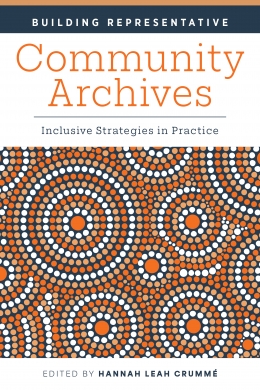Primary tabs
You don't need to be an ALA Member to purchase from the ALA Store, but you'll be asked to create an online account/profile during checkout to proceed. This Web Account is for both Members and non-Members. Note that your ALA Member discount will be applied at the final step of the checkout process.
If you are Tax-Exempt, please verify that your account is currently set up as exempt before placing your order, as our new fulfillment center will need current documentation. Learn how to verify here.
- Description
- Table of Contents
- About the author
- Reviews
Showcasing a range of projects aimed at increasing the diversity of representation in archives, the practical examples in this collection will assist librarians and archivists in their own work to document, preserve, and create access to history.
Libraries and archives are grappling with the problems created by collection practices of the past, many of which document those in power while bypassing alternate perspectives and stories. This volume examines continuing efforts in archives across the U.S. to build inclusive records that better represent the disparate histories of this country. It details varying approaches to uplifting community and activist archives that are working to preserve parallel histories, outlining a way forward that will help special collections librarians as they design projects in the future. Readers will discover
- the importance and value of records that preserve complicated, nuanced, and diverse histories;
- differences between community-created archives, community-centered archives, and archives that simply document various communities, made with little or no consultation of those whose histories are witnessed in the records;
- background on institutions’ recent collecting efforts, with case studies that illustrate innovative approaches, new techniques, errors and pitfalls, and the resilience and patience necessary to build collections;
- first-hand accounts by archivists in community organizations who are working within networks of trust to preserve and tell stories;
- how archivists are reassessing and reprocessing collections to bring the many and various stories they witness to the fore by employing changes in description detail or terminology;
- guidance on conducting, transcribing, and making accessible oral histories; and
- considerations of how to best use available resources, including equipment, time, people, and funding.
Examination copies are available for instructors who are interested in adopting this title for course use.
Introduction: Building, Reassessing, and Working Together, by Hannah Crummé
Chapter 1 “Talking White”
An Anti-oppression View Towards Transcribing and Archiving Black Narrators
Alissa Rae Funderburk
Chapter 2 Building Archives, Community, and High Impact Experiences
Oral History and Under-Represented Voices from North America’s Amazon
Deborah Gurt and Kathy J. Cooke
Chapter 3 Vietnamese Portland
Building Connections between a Private College Library and a Local Community
Hannah Crummé, Zoë Maughan, and Vân Trong
Chapter 4 Voices Out Loud
Archiving East Tennessee’s LGBTQ+ History
Donna Braquet, Kat Brooks, Alesha Shumar, Lizeth Zepeda, Louisa Trott, and Meredith Hale
Chapter 5 “Corrective Collecting”
A Practical Equity, Diversity, and Inclusion-Centered Model for the Ethical Curation and Administration of Representative Community Archives
Conor M. Casey
Chapter 6 Italian American History Collections
Melissa Marinaro
Chapter 7 Building Representative Archives
Training Archivists to Act as the (Representative/Inclusive) Bridge between an Archive and the Public
Christine Angel and Mary Elizabeth Brown
Chapter 8 It Is in There Already
Finding and Elevating the Disparate History Within
Mary Hansen
Chapter 9 The Gospel of a Community’s Archive
Michelle McCoy
Chapter 10 The Community Archives of the Oregon Jewish Museum and Center for Holocaust Education
Alisha Babbstein and Anne LeVant Prahl
Bibliography
About the Contributors
Index
Hannah Leah Crummé
Hannah Leah Crummé is Head of Special Collections and Archives at Lewis & Clark College. She completed her doctoral research at King’s College, London after which she joined The National Archives of the U.K. Crummé edited several collections, including Re-examining the Literary Coterie, 1580-1780 (2016) and Shakespeare on Record: Researching an Early Modern Life (2017; awarded the British Record Association’s Janette Harley Prize).
Have you read this book? Leave a review!
"Valuable to the archival field for its variety ... This book does an impeccable job focusing on the trust building needed in this archiving work with communities. Since the hegemony of white, male, western-colonial historical narratives tend to permeate into so many facets of our society, this book can be suggested to any archivist across the field who wishes to embed its practices in their role and counter historical marginalization."
— Journal of Western Archives
"This book is appropriate and useful for all library and archives professionals, whether experienced or new to their field, who are interested in cultivating more inclusive, representative collections, or reviewing and updating their existing holdings. Reading all 10 case studies provides a broad and thorough overview of the various types of projects being done; however, the book’s structure is such that the reader can easily jump around and read those case studies that may be most relevant to their collections and current projects. This book does not assume to have all the answers; in fact, the authors openly discuss their failures and shortcomings, but it shows that there are many ways to approach building representative archives, regardless of institutional size or availability of resources. As projects of this kind continue to grow in number and significance, resources such as this provide an excellent opportunity to learn from and share with our peers and the community."
— Technical Services Quarterly



